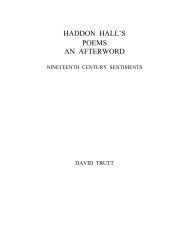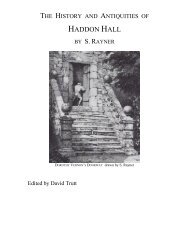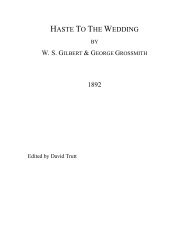WS Gilbert A Mid-Victorian Aristophanes - Haddon Hall
WS Gilbert A Mid-Victorian Aristophanes - Haddon Hall
WS Gilbert A Mid-Victorian Aristophanes - Haddon Hall
You also want an ePaper? Increase the reach of your titles
YUMPU automatically turns print PDFs into web optimized ePapers that Google loves.
34 THE ENGLISH ARISTOPHANES<br />
<strong>Gilbert</strong>’s “philosophy” is to make the best of what comes — plain and direct like all<br />
thoughts, however fanciful the arabesques that decorate them. As he puts it in Ruddigore,<br />
which, taken all for all, is perhaps the most brilliant of his extravaganzas, not excepting<br />
lolanthe or The Mikado, Every season has its cheer, Life is lovely all the year.<br />
Or, as he varies the theme in The Gondoliers:<br />
Try we lifelong, we can never Straighten out life’s tangled skein:<br />
Why should we in vain endeavor, Guess and guess and guess again?<br />
Life’s a pudding full of plums, Care’s a canker that benumbs,<br />
Wherefore waste our elocution On impossible solution?<br />
Life's a pleasant institution, Let us take it as it comes.<br />
Set aside the dull enigma, We shall guess it all too soon;<br />
Failure brings no kind of stigma — Dance we to another tune!<br />
String the lyre and fill the cup, Lest on sorrow we should sup.<br />
Hop and skip to Fancy’s fiddle, Hands across and down the middle;<br />
Life’s perhaps the only riddle That we shrink from giving up!<br />
“I take things as I find them, and I make the best of them — that's true philosophy”,<br />
says “Clarice” in suspense to “Pauline” at the opening of Comedy and Tragedy. But there<br />
are deeper notes than these, and one of them — struck by “Fairfax” in the Yeomen — sounds<br />
with solemnity now that <strong>Gilbert</strong> has himself made his exit. It renders his own voice:<br />
Why, sir, it is no light boon to die swiftly and surely at a given hour and in a given<br />
fashion! Truth to tell, I would gladly have my life; but if that may not be, I have the next<br />
best thing to it, which is death. Believe me, sir, my lot is not so much amiss.<br />
This is serious; but <strong>Gilbert</strong>’s gaiety is irrepressible and irresistible, breaking through<br />
every suggestion of gloom or despair. Some of his lyrics have an irresponsible flow of<br />
rarefied nonsense, quite unique, and quite apart from their extreme ingenuity of structure.<br />
They elude classification, yet a few instances will show that there is a real relationship<br />
between these poems of wandering paradox. From Ruddigore:<br />
Oh, happy the blossom That blooms on the lea,<br />
Likewise the opossum That sits on a tree.<br />
But when you come across ’em, They cannot compare<br />
With those who are treading The dance at a wedding,<br />
While people are spreading The best of good fare.<br />
Oh, wretched the debtor Who’s signing the deed!<br />
And wretched the letter That no one can read!<br />
But very much better Their lot it must be<br />
Than that of the person I’m making this verse on,<br />
Whose head there’s a curse on— Alluding to me!







